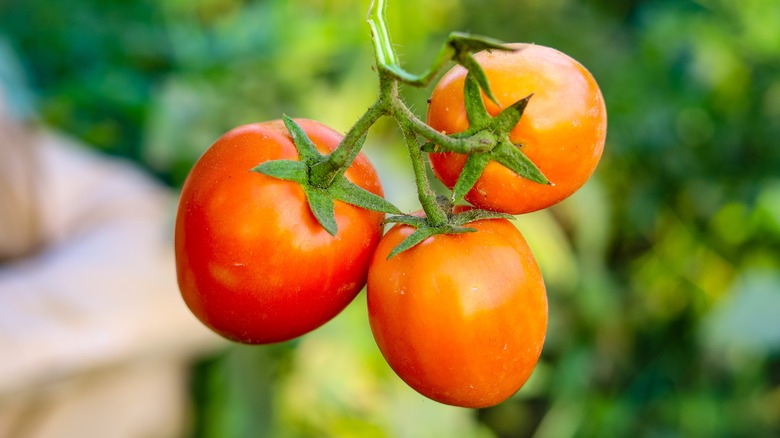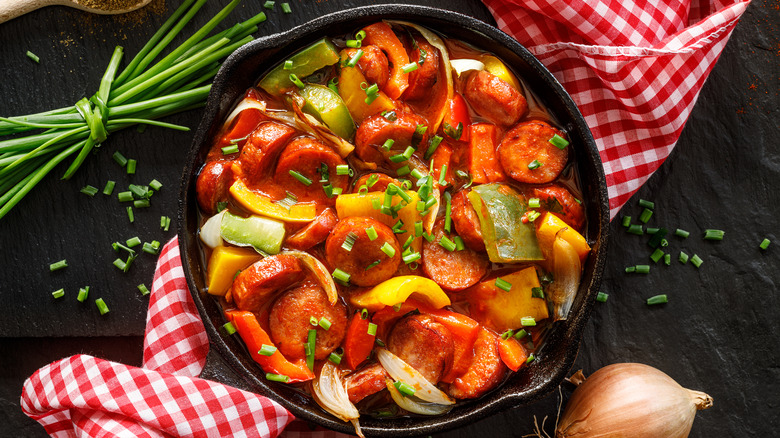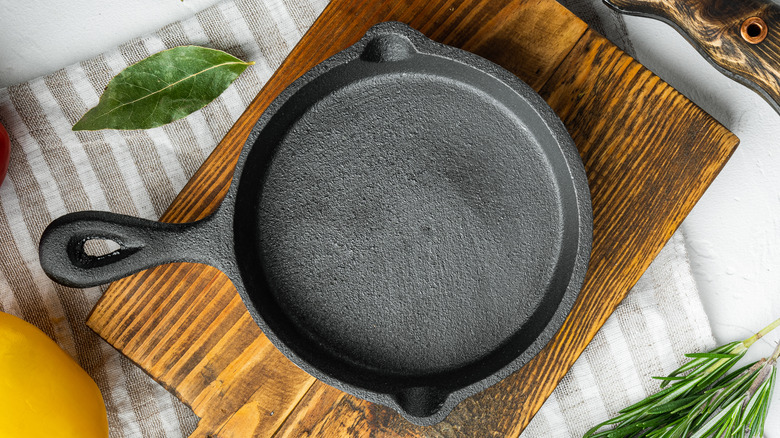You May Want To Keep Tomatoes Away From Your Cast Iron Skillet
Cast iron skillets are an essential kitchen tool in any chef's collection. Great for searing, sautéing, and even baking, they are a very versatile pan. And when properly cared for, they can last a long time. In fact, the more you cook with the pan, the more flavor it absorbs and infuses into future meals, making it better with age.
Along with its positive attributes come the unavoidable cons. Cleaning a cast iron skillet can always be a challenge since they require specific care and can be damaged by excessive soap. They could also get rusty if improperly treated. Another challenge is knowing what not to cook in a cast iron skillet, since certain foods could stick or hurt the pan.
Tomatoes are at the top of many lists of what not to cook in cast iron. But why exactly shouldn't you, and will it damage your skillet if you do?
The acidity of tomatoes can strip the cast iron skillet's seasoning
Cast iron skillets are seasoned, which means they have a hard, nonstick coating formed when a neutral oil, like vegetable or canola oil, reaches very high heat. That's why you have to be careful when caring for cast iron since traditional cleaning methods can eat away at that protective layer.
Another thing that can damage that protective seasoning is acid, and tomatoes are a very acidic fruit. Mark Haas, CEO of The Helmsman Group warns, via Southern Living, that when you cook acidic foods like tomatoes in a cast iron skillet, the acid can cause uneven heating and require you to re-season the pan.
The good news is that it takes some time to strip away the seasoning, so you may be able to get away with cooking tomatoes for short periods of time. "Cast-iron skillets can handle a small amount of acidic fruit at a time," Craig Wilson, director of Gardener's Dream, told Southern Living. "As long as you don't cook tomatoes for longer than 15 minutes or so, the acidity from the fruit won't destroy the seasoning of the pan."
Tomatoes cooked in cast iron may also impact flavor
Another thing to look out for with tomatoes is the impact on flavor. As the acidity breaks down the seasoning of the pan — or if there are any exposed metal spots — the juice from the tomatoes can react with the metal, resulting in metallic-tasting food. This reaction is especially likely for long-simmered recipes, like tomato sauce. "As tomatoes break down, metallic flavors from the pan will leech out into the sauce," Chef Jeffrey Gardner writes, via Southern Kitchen.
All that being said, there are exceptions to every rule. If you have a well-seasoned, well-cared-for cast iron skillet, that thick layer of polymerized oil may stand up to the acidity of the tomatoes.
Bin Lu, the executive chef of Blue Rock Restaurant and Tasting Room in Washington, Virginia, shared recommendations for the right way to cook tomatoes in cast iron, via Southern Living: "If I'm going to use tomatoes with cast iron, I try to stick to hard sears — things like blistered cherry tomatoes that are cooked hot and fast, maybe tossed with a little bit of garlic and herb and taken out of the pan as soon as possible. Seared green tomatoes work well because they don't give off as much liquid as ripe tomatoes."


